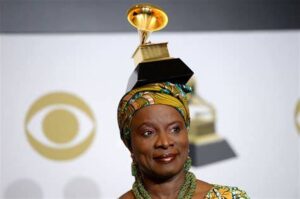Afrobeats at the Grammys: Global Recognition, Cultural Power, and the Questions Ahead
On the glittering stage of the 2025 Grammy Awards, the sound of Afrobeats pulsed through the air like a heartbeat steady, undeniable, and global. When Tems stepped up to receive her award for Best African Music Performance, the applause carried more than celebration. It carried history. For decades, African sounds had circled the global mainstream, often admired but rarely institutionalised within Western recognition systems. This year, however, that shifted again. The Grammys didn’t just include Afrobeats; they finally acknowledged its power as a distinct cultural movement reshaping pop worldwide.
The rise of Afrobeats within the Recording Academy’s structure has been steady but symbolic. For years, African artists found themselves grouped into the “Global Music” or “World Music” categories broad definitions that obscured the individuality of distinct sounds from Lagos to Accra. The creation of the Best African Music Performance category in 2024 marked a turning point. It wasn’t merely administrative; it was cultural validation a recognition that African popular music has its own creative logic, star system, and global audience.
This year’s lineup of nominees read like a snapshot of the continent’s creative renaissance: Burna Boy, Asake, Davido, Ayra Starr, and Tems, all carrying sounds that bridge borders while staying rooted in homegrown rhythm. Each artist represents a different branch of Afrobeats’ evolving family tree from Burna’s politically conscious Afro-Fusion to Ayra Starr’s youthful, cosmopolitan edge. Their presence at the Grammys underlined that Africa isn’t simply exporting talent anymore; it’s exporting entire aesthetics and business ecosystems.
Yet, the road here has been long. When Burna Boy won his first Grammy in 2021 for Twice As Tall under the “Global Music Album” category, it felt like a symbolic door opening. Wizkid’s collaboration with Beyoncé on Brown Skin Girl won the following year, cementing the idea that African voices were no longer background harmonies in global pop they were leading it. Tems’ recent win completes a trilogy of milestones that show Afrobeats’ journey from nightclub playlists in Lagos to the industry’s most prestigious stage.
Behind the applause, however, lies a deeper cultural story. The Grammys’ move to introduce a category for African music didn’t happen in isolation; it followed years of advocacy, data, and undeniable public influence. Streaming numbers showed that Afrobeats was among the fastest-growing genres globally, with millions of listeners across North America, Europe, and the Caribbean. Social media amplified that reach TikTok challenges, Spotify playlists, and international tours made it impossible to ignore the sound. In essence, the culture forced the institution’s hand.
But recognition brings complexity. For many in the African music community, the Grammy’s categorisation still raises questions. Should Afrobeats a genre with internal diversity, from Lagos Street pop to Ghanaian highlife fusion be boxed under one award? Does global recognition risk flattening its nuance? Critics argue that by grouping various African subgenres into one slot, the Academy risks repeating the same “world music” dynamic it sought to correct. There’s truth in that critique. African music is not a monolith, and one award can’t fully capture its scope.
Still, for many, the symbolic victory outweighs the structural imperfection. Artists like Davido have publicly celebrated the milestone as proof that African musicians no longer need validation from abroad to feel global, they already are. The Grammy now follows culture, not the other way around. Burna Boy echoed a similar sentiment earlier this year, noting that the focus should remain on building local infrastructure, empowering African labels, and strengthening touring circuits, rather than over-focusing on Western recognition.

At the same time, the visibility that Grammys provide has tangible industry effects. For emerging artists across Nigeria, Ghana, and South Africa, it opens new lanes of discovery. A nomination can translate into international collaborations, brand partnerships, and festival slots. It also challenges Western gatekeepers to engage with African artists as equals rather than “cultural curiosities.” In that sense, the Grammys’ move is not charity it’s adaptation. The global music economy now depends on African creativity to stay fresh.
Yet, Afrobeats’ story at the Grammys is not only about trophies. It’s about narrative control. For too long, African contributions to global music from Fela’s Afrobeat revolution to the rhythmic DNA of modern pop were undercredited. The current wave of recognition helps to rewrite that record. When Tems, Ayra Starr, or Asake take the stage, they’re not merely representing Nigeria or Africa; they’re reshaping what global music even means. The sonic centre of the world is shifting south, and the Grammys, perhaps reluctantly, are catching up.
This moment also reveals how far the African industry itself has evolved. The production quality, artist branding, and digital distribution models rival international standards. Nigerian producers like Pheelz, London, and Sarz are now behind hits that cross continents. Managers, PR strategists, and A&R teams from Lagos and Johannesburg operate with the same precision as counterparts in Los Angeles or London. The Afrobeats movement is no longer emerging it’s established, structured, and sustainable.

That doesn’t mean challenges are over. The continent’s creative sectors still face systemic hurdles from limited royalty frameworks to underdeveloped live infrastructures and inconsistent streaming payouts. But what the Grammys signal is that the global stage can no longer function without African participation. Recognition, even if partial, legitimises further investment, strengthens artist leverage, and sets new expectations for representation.
As the lights dimmed on the 2025 Grammys, with Tems’ acceptance speech echoing online, one truth felt unavoidable: Afrobeats has crossed a threshold that can’t be undone. What began as a regional rhythm now anchors global pop’s emotional core. It isn’t just inclusion; it’s influence. The Grammys may finally be recognising what the streets of Lagos, the clubs of London, and the playlists of New York have known for years that the future of music is already African.
For Nigeria’s new generation of artists, that recognition is both celebration and challenge. The world is watching. The sound has been heard. Now, the task is to keep it evolving not for validation, but for legacy.


Leave a Reply